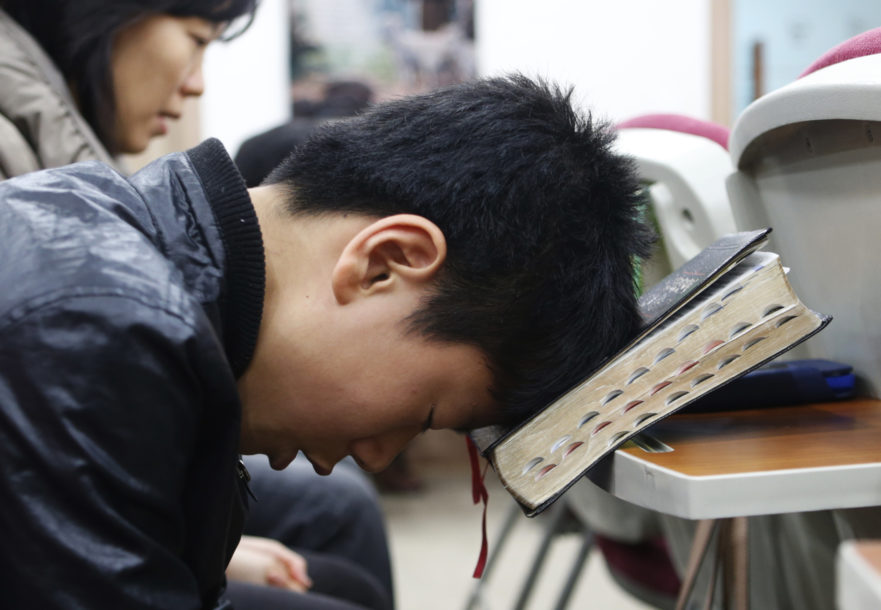May 7, 2109
North Korea is a poor totalitarian state ruled by a ruthless young dictator, Kim Jong-un, who brutally wields great power and lives a life of luxury as many North Koreans endure grinding poverty and repression. Imagine this:
“Every home, every school, every hospital, every public building and even every subway car must contain framed photos of Kim Il Sung and Kim Jong Il, the grandfather and father of the current dictator, which must be cleaned every day with a special cloth that is kept in a special box.” So writes Anna Fifield, one of the most authoritative journalists on North Korea, in her forthcoming book titled “The Great Successor”. North Korea has been ruled by the Kim family for three generations. Citizens must demonstrate total devotion to the family and its current ruler, Kim Jong-un.
“North Korea has no religion for one reason. The Kims are the religion,” said Dr. Chan-il Ahn, a North Korea defector and president of the World Institute for North Korea Studies, speaking at the 2019 Global Peace Convention in Seoul. In fact, the regime treats any expression of independent assembly or thought, including the practice of religion, as a threat to its existence.
Although it’s hard to fathom, the Korean Institute for National Unification reports that before the Korean War almost one-quarter of the country’s citizens openly practiced a range of religions including Buddhism, Confucianism, Shamanism, Cheondoism, and Christianity (Protestant and Catholic). Although he was raised by Christian parents, when Kim II Sung, the first dictator of North Korea, took power in 1948, he banned the practice of all religions. Thus began 70 years of North Korea’s identification as the most repressive country in the world for freedom of religion and belief.
While North Korea’s constitution promises a “right to faith” and government-sanctioned churches exist in the capital, in reality, there is no freedom of religion or belief in North Korea. In fact, defectors question these institutions’ legitimacy suggesting that congregants are selected with the goal of maintaining the illusion of religious freedom to the international community.
NKDB, the Database Center for North Korean Human Rights surveyed 11,730 refugees between 2007 and 2016 and found 99 percent said there was no religious freedom in the country. And 65% of the North Korean defectors NKDB interviewed for the 2017 White Paper on Religious Freedom in North Korea reported that the government has a range of punishments targeting religious practitioners, the most common being imprisonment in harsh political prison camps.
For the last 18 years, the U.S. State Department has designated North Korea as a “country of particular concern” due to the “systematic, ongoing, and egregious, violations of religious freedom” that the government commits against its 25 million citizens. And even though it’s a closed society, there is no evidence that indicates religious freedom conditions have improved. In fact, North Korea remains one of the most repressed societies in the world.
Here is some of the most recent verified information on religious freedom and related human rights in North Korea as detailed in a November 2018 USCIRF report:
- In 2017, the most current data available, NKDB documented 1,304 violations of the right to freedom of religion or belief in North Korea. The abuses included 119 killings, 87 disappearances, and 770 detentions.
- Due to a policy of collective punishment for practicing a religion, the families of those imprisoned because of their faith are often are detained as well, regardless of their own beliefs.
- According to the S. Department of State, between 80,000 and 120,000 political prisoners are being held in North Korea’s notoriously harsh labor camps. By some accounts up to 50,000 of these detainees are Christian. Former inmates often report that religious believers are singled out for most draconian treatment, such as torture, sexual abuse, and execution.
- Any religious activity practiced outside state sanctioned venues, including praying, singing hymns, and reading religious texts, often is punished severely.
At the U.S. State Department’s first-ever Ministerial to Advance Religious Freedom in 2018, North Korean defector Ms. Ji Hyeona shared her story. Ms. Ji had been repatriated back to the DPRK three times until she successfully managed to reach South Korea in 2007. As a Christian in North Korea, she had to secretly practice her faith and was subject to torture in detention centers. Ms. Ji finished her speech with a cry: “Let my people go, free North Korea.”
TAKE ACTION
- Learn more at Liberty in North Korea
- Read the 2019 USCIRF Report on North Korea
- Listen to North Korea defector Ms. Ji Hyeona’s story
Photo Caption: North Korean defector living in Seoul praying for peace and reunification of the divided Korean Peninsula. Credit: Reuters/Lee Jae Won

